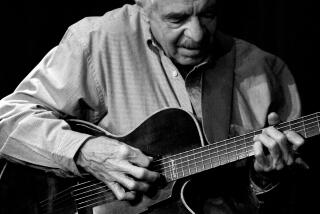This Time, Spano Needs Little Encouragement : Seminar: The actor, who got help and advice as a novice, is eager to pass on his knowledge at artists’ workshop in Irvine.
- Share via
IRVINE — Joe Spano understands the importance of mentors. The Emmy Award-winning actor has had several during a career in which he’s been both obscure and renowned.
“I’ve had a number of people that have helped and given me advice, from my college days on up,” said Spano, who’s probably best known as the sensitive, forever-troubled Lt. Henry Goldblume on “Hill Street Blues.” “There was the encouragement I received while at (UC) Berkeley (studying drama) and then the more practical stuff.
“I can remember when I was in my first movie (George Lucas’ ‘American Graffiti’ in 1973) and had been trained for the stage. When I was getting prepared to do my first scene (one of Lucas’ assistants) just took me aside and said, ‘You think about what you’re saying and we’ll take a picture of it.’ It was as simple as that. A lot different than what I was used to, but it made sense.”
Spano may include that suggestion as he engages in a little mentoring of his own Wednesday for Irvine Valley College’s third annual Professional Artists Seminar. The program, which runs from 9 a.m. to 2 p.m., is free but does require prior registration.
Spano will join, among others, Al Desio, a dancer and actor who was in the original Broadway casts of “Fiddler on the Roof” and “West Side Story,” film choreographers Jacqui and Bill Landrum, movie and stage performer George De La Pena, Mark Taper Forum and the Taper Too manager Karen Wood, and television producer and director Jerry Evans.
“I plan to answer questions and tell a bit of what to expect with the old ‘Hollywood Shuffle,’ ” Spano said during a phone interview from his home in Venice, Calif. “Mainly, the advice I’d give is that the business is self-limiting. If you have the stamina to take the rejection, coupled with self-confidence and the belief in yourself, you’ll take it as far as you can.
“The people who know they’ve got the talent and the drive will go all the way no matter what anyone says. My suggestions (for those with some doubt) is to get as much training as possible because that’s something you can always depend on.”
Would-be actors should also be aware that it’s called an “industry” for a good reason, he added.
“What I’m interested in is warning them that it is a business, and that may come in conflict with their feelings about art. I also want to say how wonderful it is: the family of relationships you develop as an actor, the intellectual and emotional fulfillment you receive. You become an emissary of the culture.”
Spano has been involved with the stage and screen for several years, most notably during the ‘80s. Besides his work in “Hill Street Blues,” Spano won an Emmy in 1989 for his role in a “Midnight Caller” episode.
Locally, Spano appeared in David Mamet’s “Speed-the-Plow” at South Coast Repertory in 1990 and Richard Sheridan’s “The School for Scandal” in 1988, also at SCR.
These days, you may hear Spano before seeing him. While still active in television, he’s been busy with L.A. Classic Theatreworks, a radio acting company that has recorded plays, novels and short stories for the BBC, National Public Radio and KCRW in Santa Monica. Spano and L.A. Classic are recording all of Chekhov’s short stories.
As for the seminar, organizer Ron Ellison, an Irvine Valley College theater professor, said it should appeal to a wide range of people simply because various disciplines are offered.
“The information they get is massive, from people who really know what they’re talking about,” Ellison said. “I think people can find a direction here, a line toward success.”
There is no charge, Ellison said, because the panelists are volunteers “wanting to have a good time and give something back to the industry they love.”
Ellison added that he was surprised by last year’s turnout. While he expected college-age hopefuls, Ellison was impressed by the range in ages. “We had older folks, community-theater actors, people in the business end and those that were curious,” he said. “We even had the 11- and 12-year-olds with their parents. It was wonderful.”
More to Read
The biggest entertainment stories
Get our big stories about Hollywood, film, television, music, arts, culture and more right in your inbox as soon as they publish.
You may occasionally receive promotional content from the Los Angeles Times.










